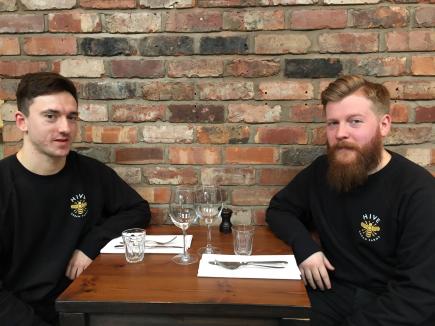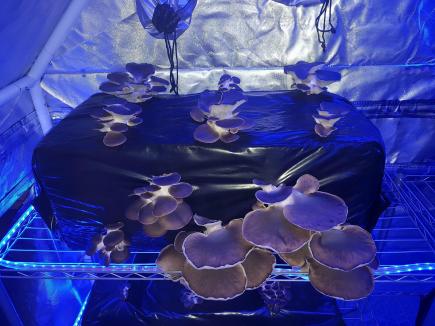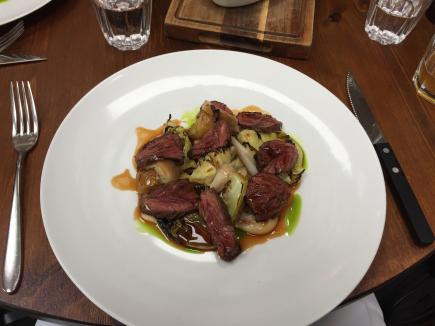Sustainability and localism are central to the mission of Manchester-based start-up Hive Urban Farms, who provide fresh, high-quality produce to some of the area’s top restaurants.
MM met up recently to chat to co-founders Gareth Williams and Dien Curtis about the story of the company’s roots and their plans for growth.
With its quiet residential streets housing students, families and young professionals, Burnage isn’t the first place you’d picture when thinking of freshly grown produce.
Yet it’s from a small facility in this Manchester suburb that Hive Urban Farms grow gourmet oyster mushrooms that are used by some of the local area’s best restaurants.
Burnage’s best produce currently features in dishes at Hispi in Didsbury, TNQ Restaurant and Bar and Fress in the city’s Northern Quarter, with chefs heralding the quality of the product and benefits of a local supplier.
“We’re about localism, sustainability and independent businesses – our product can go from farm to fork in hours, not days,” Gareth explains.
“The things that we’ve been hearing have been really encouraging – it’s so much fresher, it’s a better quality product – that’s from feedback we’re getting from chefs”.
Though their branding is a nod to Manchester’s industrious past, Hive’s activity is distinctly forward-thinking – a socially conscious enterprise that promotes sustainability and localism.
Their small facility uses simple but innovative indoor farming techniques to mimic the optimal conditions for mushroom growth. Instead of soil, blocks of a specially formulated nutrient or used coffee beans are used as a medium for growth.

FARMING PIONEERS: Dien Curtis and Gareth Williams are the brains behind Hive
The product can be harvested at short notice and delivered to the customer within the hour.
“The food industry in Manchester is really thriving now,” Dien says.
“There are a lot of new businesses starting up in the city and a lot of them are focusing on sustainability and localism, which is a really nice thing.”
The pioneering pair – both 23 – met while studying Geography at the University of Manchester.
Like many of the best ideas, Hive was concocted in the pub – though refined through weeks and months of diligent research and painstaking trial and error.
Now each balances their work for Hive with a full-time job – Dien in marketing for Manchester Metropolitan University, Gareth in a policy role for the Greater Manchester Combined Authority.
Beyond what’s on the plate, the two are keen to promote the multifarious benefits of urban agriculture – in being kinder to the planet, we become more self-sufficient while developing a viable business in a growing sector.
Gareth enthuses about the social benefits on offer: as a form of therapy for those suffering from mental health issues, a way to repurpose disused urban buildings, or a way to ease ex-offenders or the long-term unemployed back into work.

BIG SHROOM: The produce in the latter stages of growth
“What urban agriculture offers from a socio-economic perspective is huge – you don’t need any formal qualifications to do it, you don’t need any fixed working hours, and you can train on the job.”
Though Hive is one of a handful of companies operating under the wide umbrella of urban agriculture, the UK still has some distance to go to catch up with countries like Japan and the USA.
“The thing about it in this country isn’t that we’re not very good at it – it’s that there aren’t many people doing it,” Gareth says.
For some perspective, the organic farming market in the country is worth over £2bn, though that’s less than 2 per cent of the £112bn food and drink production sector. Urban agriculture is tinier slice still of this enormous pie.
Dien is confident: “It’s a really small sector, but it has the potential to be massive.”
“You’ve got a global food production network where we’re flying food in from across the world with absolutely no concept of the environmental impact. It’s unsustainable.”
“The main issue is price at the moment, that’s why we’re targeting restaurants that we feel appreciate localism, chefs who have a strong sense of sustainability themselves.”
A pivotal moment came when the business was chosen to join the AccelerateME programme, an initiative launched by Manchester Entrepreneurs to assist enterprising students and recent alumni from The University of Manchester.
“At that point the business was really an idea – a few in-house experiments in Tupperware boxes,” Dien says.
“We’d never spoken in front of an audience about Hive before.”
“We were really going for it, but it was nervy – you’re talking about something that means a lot to you.”

DISH OF THE DAY: The mushrooms are used by top restaurants including Hispi in Didsbury
A rigorous selection process saw the fledgling business pitted against over 40 other start-ups from a broad range of sectors, culminating in a pitch to leaders of the scheme and other teams.
Hive was chosen as one of just five start-ups to receive an initial investment as well as guidance and resources to help professionalise the operation.
Since then, the past year has mostly involved perfecting the process and drumming up interest in the product – meeting with potential customers and attending exhibitions, including The Global Food Innovation Summit in Milan last May.
Plans for future crops – including herbs, greens and hops – are already in motion, with the two also exploring a second site to serve Chorlton’s thriving food and drink sector.
As people become more considerate about the source and quality of the food on their plate, the buzz around Hive will continue to grow.



